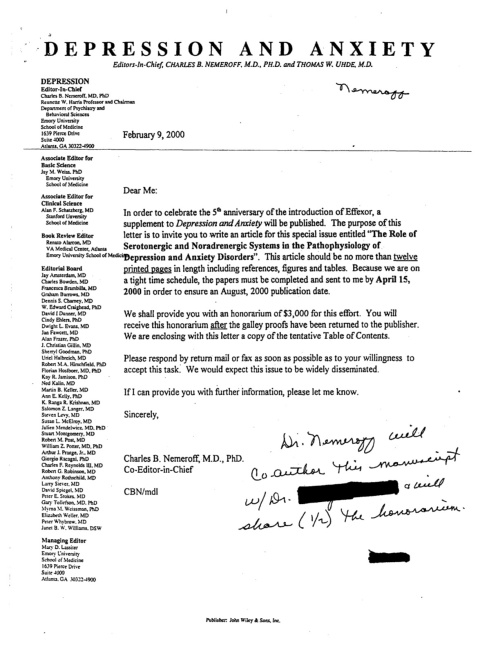Charles Nemeroff, you know the guy, who signed a letter dated July 15, 2004, promising Emory administrators that he would earn less than $10,000 a year from GlaxoSmithKline to comply with federal rules. Ironically on that day, he was at the Four Seasons Resort in Jackson Hole, earning $3,000 of what would become $170,000 in income that year from that company — 17 times the figure he had agreed on. Mr. Nemeroff resigned as chair of the psychiatry department at Emory University in October after this news broke thanks to Senator Charles Grassley.
A leading critic of the Food and Drug Administration (FDA) since the surprise withdrawal from the market of Merck’s painkiller Vioxx in 2004, Grassley is now focusing on university researchers funded by the National Institutes of Health (NIH) who haven’t been properly reporting income from drug companies.” Straight talk with…Charles Grassley, Nature Medicine, October 2008
now this is when it gets bizarre.
From the WSJ Health Blog
We’ve heard of Dear Doctor letters before, but a “Dear Me” letter? That’s a new one on us.
But we’ve now learned that Emory University psychiatrist Charles Nemeroff penned just such a thing in 2000 when he was also serving as editor in chief of the journal Depression and Anxiety. The “Dear Me” letter, on the journal’s letterhead, indicated he was paying himself $3,000 to write an article for a special supplement of the medical journal that would “celebrate the 5th anniversary of the introduction of Effexor” –- an antidepressant from Wyeth.
According to Sen. Charles Grassley (R., Iowa) , who has been investigating drug company payments to a bunch of academic psychiatrists, Nemeroff also billed an Emory account $3,000 for the work. The money Emory used to pay him came from a grant Wyeth gave to the school, according to Grassley.
It isn’t clear, however, from the correspondence if Nemeroff was paid by the both the school account and the medical journal. According to Emory, 14 of its faculty members each received $3,000 from that fund to pen articles for the special section on Effexor. Calls to Emory and Nemeroff for comment weren’t returned immediately.
here’s the “Dear Me” letter:






Recent Comments